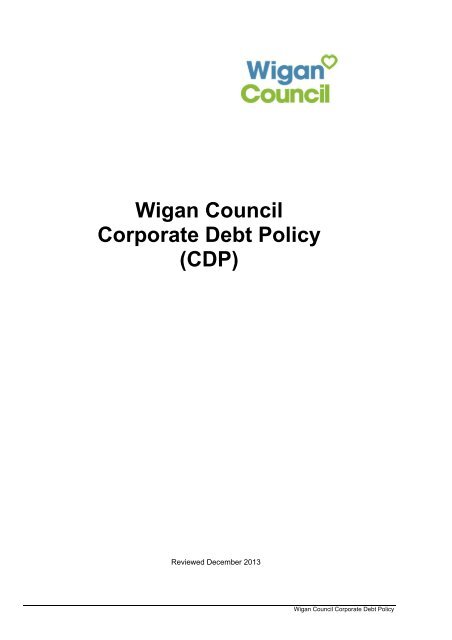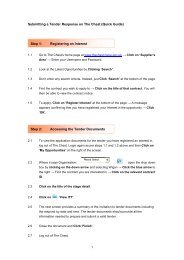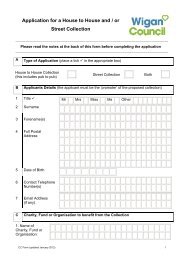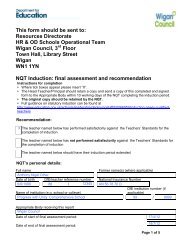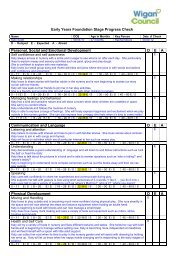Wigan Council Corporate Debt Policy
Wigan Council Corporate Debt Policy
Wigan Council Corporate Debt Policy
Create successful ePaper yourself
Turn your PDF publications into a flip-book with our unique Google optimized e-Paper software.
<strong>Wigan</strong> <strong>Council</strong><strong>Corporate</strong> <strong>Debt</strong> <strong>Policy</strong>(CDP)Reviewed December 2013<strong>Wigan</strong> <strong>Council</strong> <strong>Corporate</strong> <strong>Debt</strong> <strong>Policy</strong>
<strong>Corporate</strong> <strong>Debt</strong> <strong>Policy</strong> (CDP)“<strong>Debt</strong> is not a problem until someone isunable to pay it”Part 1:What is a CDP and why have one?1.1 What is a <strong>Corporate</strong> <strong>Debt</strong> <strong>Policy</strong>?The CDP is the <strong>Council</strong> statement on how it will work with its customers and partners tocollect debt. It will outline what it will do to help those who are in debt. As a minimum, the<strong>Council</strong> will have as an objective that an individual’s indebtedness does not worsen.The <strong>Council</strong> has formalised the policy for the following reasons:‣ It is a good practice and allows all involved in the policy to understand what the<strong>Council</strong>’s debt management approach is. This promotes efficiency and consistencyin the collection of debt. This is important as the collection of income is vital inproviding resources to deliver services.‣ The <strong>Council</strong> recognises that early and professional debt advice is an importantelement of the Government’s Anti-Poverty Strategy and this policy promotes positiveactions in assisting those who may be unable to access mainstream financialservices.1.2 Why have a <strong>Corporate</strong> <strong>Debt</strong> <strong>Policy</strong>?Having a CDP is a good practice and ensures that all the people involved in the collectionof money owed to the <strong>Council</strong> have a consistent approach and an understanding what thatapproach is.This not only promotes efficiency, effectiveness and consistency in the collection of debt, itis an essential requirement to ensure the maximisation of revenue streams to provideresources which the <strong>Council</strong> needs to deliver services.An understanding of an individual’s or a commercial organisation’s problems will enablethem to access the appropriate help, assistance and benefits to allow them to pay their billsand help maintain the <strong>Council</strong>’s cash-flow.<strong>Wigan</strong> <strong>Council</strong> <strong>Corporate</strong> <strong>Debt</strong> <strong>Policy</strong> 3
1.3 What is a debt?For the purposes of the CDP, a debt is defined as any amount of <strong>Council</strong> income that hasnot been paid by the due date. All <strong>Council</strong> bills and invoices etc will be raised as soon as itis practicable, and will include clear, relevant and full information as to:‣ What the bill is for‣ When payment is due‣ How to pay‣ How and who to contact for further information and/or advice.1.4 Why do people owe money to the <strong>Council</strong>?People can owe the <strong>Council</strong> money for many different things including:‣ <strong>Council</strong> Tax‣ National Non Domestic Rates‣ Housing Rents‣ Housing Benefits and <strong>Council</strong> Tax Benefits Overpayments‣ Market stall charges‣ Income from Planning Applications, Building regulations and Land Charges‣ Adult Services – Care fees‣ Rental income from property e.g.: ground rents and leases‣ Other invoiced items, statutory charges and the supply of goods or services.‣ Fixed penalties for traffic violations and environmental crime1.5 Balancing customer care with debt collectionIt is very important to the <strong>Council</strong> that it is able to collect income due to it. This helps the<strong>Council</strong> to pay for the services it delivers and therefore customers not paying bills impactson service levels. Although it is the <strong>Council</strong>’s duty to collect all outstanding amounts owedto it, it also has a duty to be fair to all citizens.When customers find themselves in difficulty in paying their bills the <strong>Council</strong> wants them tounderstand that we are here to help if we can and what our approach will be and that theapproach is transparent, consistent and equitable.There is a need to ensure that people, businesses and organisations pay their bills so thatthe <strong>Council</strong> can continue to provide services to its community, but the <strong>Corporate</strong> <strong>Debt</strong><strong>Policy</strong> also recognises difficulties sometimes arise that affect the payment of bills. Thispolicy will describe how the <strong>Council</strong> will approach this in Part 2 - Helping customers<strong>Wigan</strong> <strong>Council</strong> <strong>Corporate</strong> <strong>Debt</strong> <strong>Policy</strong> 4
Part 2:Helping Customers2.1 IntroductionWe can make it easier for Customers to pay by making sure they know:IF PAYING A BILL:‣ How they can pay‣ Where they can pay‣ To quote the correct references so that their account is credited quickly andcorrectly.IF THEY ARE UNABLE TO PAY IN FULL:‣ That in the majority of instances, consideration can be given if a customer requiresadditional time to make payment‣ The customer should contact the <strong>Council</strong> as soon as possible - as the <strong>Council</strong> maycontinue to take action to collect a debt if there is no response‣ The <strong>Council</strong> will require the outstanding amount to be cleared as quickly as thecustomer’s finances will allow.‣ That <strong>Council</strong>’s debt recovery staff are available to discuss Customers’circumstances, to provide guidance and, where possible, consider alternativerepayment options such as instalments or extra time to pay.‣ Where appropriate the <strong>Council</strong> will refer debtors to advice agencies for help withmoney management and debt.‣ Customers should make contact immediately if they are unable to make aninstalment payment or if their circumstances change that will affect their repayment.2.2 The <strong>Council</strong>’s approach to providing help and adviceThe <strong>Council</strong> will offer early and professional advice to all of its customers and customerscan help us to help them by contacting us as soon as they are aware that a problem exists.CONTACT US FIRST:All <strong>Council</strong> communications will state:‣ How and who to contact for information, disputes and payment advice‣ That early communications are essential in helping to resolve debt problemsThe <strong>Council</strong> want to help its residents and businesses to meet their financial commitments.At the same time the <strong>Council</strong> has a duty to ensure that people and businesses pay theirbills as quickly as possible in order for it to fund essential service.The <strong>Council</strong> will endeavour to balance these two aims by taking the following action:<strong>Wigan</strong> <strong>Council</strong> <strong>Corporate</strong> <strong>Debt</strong> <strong>Policy</strong> 5
Step-Change <strong>Debt</strong> Charity (Formerly: Consumer Credit Counselling Service)0800 138 1111www.stepchange.orgMoney Advice Service0300 500 5000www.moneyadviceservice.org.ukUnify Credit Union01942 701 706www.unifycu.orgWelcome Credit Union for personal loans and financial advice01942 828 702www.welcomecreditunion.co.uk<strong>Wigan</strong> and Leigh HousingTel: 01942-705040www.walh.co.ukFree, confidential help and advice for Businesses can be found at:Business <strong>Debt</strong> Line0800197 6026www.bdl.org.ukThere are many other advice call centres and websites available on-line, though many sitesare profit-making and will charge for their services – customers are advised to use care andcheck for fees and charges when selecting any of these services.Doorstep Loan and Pay-Day Loan Companies appear to be an easy option for obtainingcash but everyone should be made aware of the pitfalls of these loans and the very highinterest rates that they charge. For this reason the <strong>Council</strong> has banned access tocompanies offering theses services via <strong>Wigan</strong> <strong>Council</strong> computers and has prevented themfrom advertising in <strong>Council</strong> owned spaces.All this information has been incorporated into a <strong>Council</strong> leaflet: “<strong>Debt</strong> Problems” which isavailable to collect at the Life Centres and other <strong>Council</strong> and information outlets throughoutthe Borough. (Copies can be obtained by contacting IncomeGroup@wigan.gov.uk or Tel01942-488350)<strong>Wigan</strong> <strong>Council</strong> <strong>Corporate</strong> <strong>Debt</strong> <strong>Policy</strong> 7
2.4 Paying by instalmentsWhen Customers find themselves in difficulty with debt and request instalments the <strong>Council</strong>will individually assess the customers’ whole financial position (by taking into account all oftheir expenditure and all of their income) to assess their ability to pay. Where instalmentarrangements can be entered into, the repayment rate will be based on a proportion of thecustomer’s disposable income and realistic arrangements will be entered into for therepayment of debts in preference to taking legal action.When agreeing instalments the intention is that all debts should be cleared as soon aspossible, however, it may not always be appropriate to offer payment by instalments e.g.:where a customer has requested goods or services from the <strong>Council</strong>, (they would beexpected to have the funds to pay for what they have ordered,) or where regulations (thelaw) prevent this or where the cost to the <strong>Council</strong> to collect the payment in instalments isgreater than the amount of the debt or if the repayment rate/period is not viable.The <strong>Council</strong> will consider what course of action is appropriate as follows:‣ Payment can be made within 3 months – can often be agreed without the provision ofa formal pro-forma for details of income and expenditure and verbal assurances maybe sufficient.‣ Payment would take longer than 3 months – would require the completion of a proformawith supporting evidence of income and expenditure.NB: certain types of debt may require more detailed assessment or a greater level ofadditional or supporting documentation before instalments can be granted.To determine the level of instalments, the <strong>Council</strong> will use a standard Income andExpenditure details pro-forma which takes account of the standards and guidelinesavailable nationally and as operated by other public bodies e.g.: the County Courts.Once an arrangement is made Customers are expected to comply with that arrangementbut where that becomes difficult, contact should be made to discuss further options.2.5 ComplaintsShould any customer feel dissatisfied with how they have been treated the <strong>Council</strong> has acomplaints procedure which can be accessed at http://www.wigan.gov.uk/<strong>Council</strong>/Contactus/<strong>Council</strong>-Complaints.aspxThe corporate complaints procedure provides the <strong>Council</strong> with the opportunity to investigateand, where appropriate, provide a remedy in circumstances where the <strong>Council</strong> is alleged tohave been guilty of "maladministration" which has caused injustice (and where there is noother reasonable avenue available to the complainant to appeal or seek redress). It isimportant to note, however, that the corporate complaints system cannot entertainobjections against the merits of a decision which has been properly taken and which thecomplainant does not agree with.<strong>Wigan</strong> <strong>Council</strong> <strong>Corporate</strong> <strong>Debt</strong> <strong>Policy</strong> 8
In the event that the complainant remains dissatisfied after the <strong>Council</strong> has investigated thecomplaint, the complainant may refer his/her complaint to the Local GovernmentOmbudsman, who is independent of the <strong>Council</strong>, but will not consider a complaint wheremore than 12 months has elapsed since the alleged act/omission.NB: Some complaints in respect of certain debt matters are also supported by specialist orindependent bodies e.g.: The Appeals service, The Housing Ombudsman and LocalGovernment Ombudsman. Details of these bodies together with any external referrals willbe provided to customers by the team dealing with the complaint.2.6 Rights of AppealThere are a number of ways in which people can appeal about decisions the <strong>Council</strong> mayhave taken:Valuation Tribunal: For people who believe the <strong>Council</strong> has acted incorrectly on a <strong>Council</strong>Tax billing matter.Magistrates Court: For people who are aggrieved by the recovery process for <strong>Council</strong> Tax,Fixed Penalties and Non-Domestic Rates and for Non-Domestic Rates payers who believethe <strong>Council</strong> acted incorrectly on a billing matter.Appeal Tribunal: For decisions made on Housing Benefit claimsCounty Court: For those defending action to repossess <strong>Council</strong> houses, action taken torecover Housing Benefit overpayments and for Sundry Invoices.2.7 Delivering the <strong>Policy</strong>The <strong>Council</strong> will take steps to:‣ Give early advice to the customer on repayment options and where to getassistance with debt problems‣ Make all advice on how and where to pay clear and simple.‣ Raise awareness of a debt as quickly as possible and take action when it says it willif the amount remains unpaid.‣ Raise the implications for non-payment – review all reminders and lettersperiodically, change type face, font, printing and paper colours, if required toheighten the impact.‣ Review each case individually, taking into account the known circumstances of thatcustomer, if possible and endeavouring to find a remedy before taking anyproceedings.‣ If an account remains unpaid then advise the customer what will happen and let thecustomer know which organisations or agencies can advise them and how they canget in touch with them.A leaflet has been produced titled “<strong>Debt</strong> Problems” in support of this policy whichprovides advice for individuals and businesses and this is available at the LifeCentres, other council and information outlets and can be obtained by contactingIncomeGroup@wigan.gov.uk or Tel 01942 488350.<strong>Wigan</strong> <strong>Council</strong> <strong>Corporate</strong> <strong>Debt</strong> <strong>Policy</strong> 9
Part 3:Additional Information3.1 Welfare Reform Act 2012 and Universal CreditThe Welfare Reform Act 2012 introduced Universal Credit to transform many of the existingbenefit options and to:Simplify the benefits and tax credits systemIncrease incentives to assist and encourage people back into workCare for the most vulnerable members of our societyImprove the fairness of the benefit claiming and payment process for claimant andtax payer alikeUniversal Credit is a principle part of these reforms and seeks to replace:Housing BenefitIncome SupportChild Tax CreditsWorking Tax CreditsIncome based Job Seekers Allowance (JSA)Income related Employment and Support Allowance<strong>Wigan</strong> <strong>Council</strong> is committed to making a seamless transition for the reforms and to provideguidance and Personal Budgeting Support to all claimants, likewise this <strong>Corporate</strong> <strong>Debt</strong><strong>Policy</strong> will encompass all relevant and associated debt matters that may arise fromUniversal Credit and provide the same understanding, assistance and equitablearrangements to assist all customers.More information on Universal Credit can be found at:https://www.gov.uk/government/publications/universal-credit-frequently-asked-questionsandIntroduction to Universal Credit3.2 Protecting the <strong>Council</strong> from Late PaymentThe <strong>Council</strong> is supported by current UK and EU legislation to recover any amountsexpended in recovering overdue amounts from debtors who unnecessarily avoid or delaypayment. Examples of these fees are: late payment charges, Court action fees,Enforcement Agent’ fees, interest and these may be charged to the debtor’s account. Theaim of the legislation is to reimburses the <strong>Council</strong>’s costs in taking debt recovery action,prevents the citizens of the Borough having to bear the costs of recovering debt from this<strong>Wigan</strong> <strong>Council</strong> <strong>Corporate</strong> <strong>Debt</strong> <strong>Policy</strong> 10
minority of customers and also acts as a deterrent against deliberate or malicious nonpayment.The relevant legislation relating to recovering these charges is shown below along with linksto obtain further information;DIRECTIVE 2011/7/EU ON COMBATING LATE PAYMENT IN COMMERCIALTRANSACTIONShttps://www.gov.uk/government/publications/late-payment-directive-user-guide-to-therecast-directiveLate Payment of Commercial <strong>Debt</strong>s (Interest) Act 1998http://www.legislation.gov.uk/ukpga/1998/20/section/2Local Government Act 1972http://www.legislation.gov.uk/ukpga/1972/70/section/111Local Government Finance Act 1992www.legislation.gov.uk/ukpga/1992/14/contentsLocal Government Act 2003http://www.legislation.gov.uk/ukpga/2003/26/section/93Localism Act 2011http://www.legislation.gov.uk/ukpga/2011/20/section/3/enactedTraffic Management Act 2004www.legislation.gov.uk/ukpga/2004/18/pdfs/ukpga_20040018_en.pdfTaking Control of Goods Regulations 2013 (comes into effect 6.4.14)http://www.legislation.gov.uk/uksi/2013/1894/made3.3 Recovery Action pathwayThe following table sets out the various collection pathways for the major debt topics withinthe <strong>Council</strong>’s debt portfolio, however it should be noted that the <strong>Council</strong> operates many ofits recovery pathways in cooperation with private and public sector partners to rationaliseservices and achieve efficiency.As such the <strong>Council</strong> retains the option to utilise collection and enforcement agents fromboth the private sector and the courts to carry out associated or appropriate enforcementactions on behalf of the <strong>Council</strong> to prevent or mitigate the need to escalate debts along thecollection pathway shown below.<strong>Wigan</strong> <strong>Council</strong> <strong>Corporate</strong> <strong>Debt</strong> <strong>Policy</strong> 11
<strong>Corporate</strong> <strong>Debt</strong> Portfolio: Collection Pathways.Type of <strong>Debt</strong> Charging Method *Default CollectionPathwayAppeals<strong>Council</strong> Tax Annual Bill Magistrates Court To the Valuation AppealsOffice.Sundry <strong>Debt</strong> Invoice County Court By application to DistrictJudgeParking Penalties Penalty Notice County Court To IndependentAdjudicatorHousing RentsAnnual notification ofweekly chargeCounty CourtBy application to DistrictJudgeNNDR Annual Bill Magistrates court To the Valuation AppealsOffice.Housing Ben O/payments Invoice County Court To the Tribunal andAppeals ServiceAdult Care Services Statement invoice County Court By Judicial Review via theCounty CourtGround Rents Annual Invoice County Court By application to DistrictJudgeCommercial Rents Periodical Invoice County or High Court By Application to theCourt/JudgeTruancy Penalties Penalty Notice Magistrates court To school for reclassificationof unauthorisedabsenceOption of Final Resort(Persistent/deliberateDefault)Fine and/or custodial sentenceDeducts. from wages/bens., seizingpossessions/bank assets, chargingproperty.Bailiff action – seizing of vehiclePossession action and evictionFine and/or custodial sentenceDeducts. from wages/bens., seizingpossessions/bank assets, chargingproperty.Deducts. from wages/bens., seizingpossessions/bank assets, chargingproperty.Deducts. from wages/bens., seizingpossessions/bank assets, chargingproperty.Possession action and evictionFine and/or custodial sentenceEnvironmental Crime fixedpenaltiesPenalty Notice Magistrates court Directly to the Magistrate Fine and/or custodial sentenceHsg.RechargeableRepairs Invoice County Court By application to DistrictJudgeDeducts. from wages/bens., seizingpossessions/bank assets, chargingproperty.Action following the exhaustion of all prescribed/standard recovery efforts e.g.: after written, electronic, verbal contacts and remindershave failed to illicit a sustainable payment response from the debtor.<strong>Wigan</strong> <strong>Council</strong> <strong>Corporate</strong> <strong>Debt</strong> <strong>Policy</strong>


